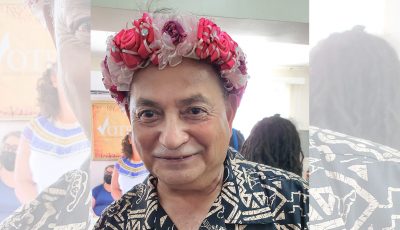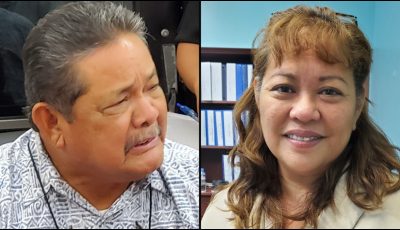Garber cites testimonial immunity, objects to JGO subpoena for Torres’ executive assistant
Babauta says objection has no legal basis and that JGO prepared to enforce subpoena, including contempt proceedings
The Washington, D.C.-based lawyer hired by Gov. Ralph DLG Torres to represent him in the ongoing investigation of the House of Representatives Judiciary and Governmental Operations Committee on his expenditures of public funds and travels has objected to the committee’s subpoena for the governor’s executive assistant to testify, asserting that Frances Dela Cruz has testimonial immunity.
Committee chair Rep. Celina R. Babauta (D-Saipan), however, stated yesterday that the objection of Ross Garber of the Garber Group LLC law firm has no legal basis and that Dela Cruz, the executive assistant to the governor, remains subject to subpoena for the hearing tomorrow, Thursday.
Babauta said they are prepared to enforce the subpoena through legal remedies, to include but not limited to, contempt proceedings.
She said they are willing to meet with counsel for Dela Cruz and counsel for the Office of the Governor to discuss any privileges or immunities she may be afforded by CNMI law. “But we will not be distracted from doing the people’s business by delay tactics or obstruction,” she said.
Garber, who is known for his expertise in impeachment proceedings, wrote Babauta last Oct. 11, stating his objections to the subpoena for Dela Cruz to testify.
Garber pointed out that the CNMI Constitution mirrors the separation and balance of powers embodied in the U.S. Constitution, and this applies to the testimonial immunity of certain Executive Branch officials. Just as the U.S. President is the head of the Executive Branch, the governor is the head of the Executive Branch of the CNMI, he said.
He said the U.S. Department of Justice, under both Republican and Democratic Presidents, has long explained that pursuant to the Constitution’s separation and balance of powers principles, senior aides to the President have complete immunity from congressional subpoenas.
Garber said the CNMI Constitution reflects the same separation of power’s principles, thereby affording immunity to senior advisers to the governor from legislative subpoenas.
“Inasmuch as Ms. Dela Cruz is clearly a senior [adviser] to the governor, she is afforded testimonial immunity. We therefore object to the subpoena on that basis,” Garber said.
Babauta said Garber cites U.S. federal Executive Branch memoranda, including from then-associate attorney general Rudy Giuliani to back up his claim, yet cites no case law, whether federal, CNMI or otherwise. In fact, Babauta said, numerous jurisdictions, including federal courts, have explicitly held that Executive Branch aides do not possess absolute testimonial immunity.
She said that, in a case cited by Garber’s memos, the District Court for the District of Columbia noted that “the Executive’s current claim of absolute immunity from compelled congressional process for senior presidential aides is without any support in the case law.”
Babauta noted that the Legislature’s “ability to obtain evidence from the governor…is in furtherance of the critical constitutional check…on executive authority necessary to preserve the Constitution’s careful balance of powers, not in derogation of it.”
Babauta described Garber’s communication as part of a pattern of procedural roadblocks by the Executive Branch, particularly since Garber does not represent Dela Cruz. “The pattern of delay and procedural roadblocks at every turn has continued from the Executive Branch,” said Babauta.
She said Dela Cruz’s counsel, Viola Alepuyo, advised that she would be unavailable most of this week and next week.



























